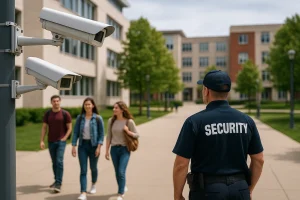The Critical Role of Security Guards in Thwarting Data Breaches and Corporate Espionage
Protecting sensitive data becomes a paramount task for businesses of all sizes. Corporate espionage and data breaches are not just plotlines for thrilling movies; they are real-world threats that cost businesses billions annually. While high-tech cybersecurity measures are crucial, the human element in the security protocol, embodied by professionally trained security guards, often proves to […]
By David Kerolles
July 25, 2023
Protecting sensitive data becomes a paramount task for businesses of all sizes. Corporate espionage and data breaches are not just plotlines for thrilling movies; they are real-world threats that cost businesses billions annually. While high-tech cybersecurity measures are crucial, the human element in the security protocol, embodied by professionally trained security guards, often proves to be the linchpin in a comprehensive security strategy.
Understanding the Stakes: Data Breaches and Corporate Espionage
- Before delving into the role of security guards, it’s vital to understand the threats businesses face. A data breach involves unauthorized access to confidential information, potentially resulting in its theft, corruption, or loss. Corporate espionage is a more directed threat, where specific competitors or adversaries target your valuable data—trade secrets, client information, product plans, and more—for their gain. The consequences? Financial loss, damaged reputation, legal repercussions, and a shaken client trust that takes years to rebuild.
Beyond the Digital Frontier: The Physical Security Factor
- While cybersecurity measures form the first line of defense against data breaches and espionage, physical security is the fortress that safeguards your business’s integrity. Here’s where security guards come into play.
1. Access Control:
- Security personnel effectively manage who gets access to sensitive areas within your business premises. By maintaining a controlled entry system, guards ensure no unauthorized individuals or intruders can physically access areas where sensitive data is stored, be it hard copies or digital servers.
2. Surveillance and Monitoring:
- Constant surveillance helps in early detection of suspicious activities. Security guards monitor CCTV feeds, patrol the property, and identify any unusual behavior, preventing potential breaches.
4. Insider Threat Prevention:
- Not all threats to business data come from the outside. In some cases, employees or temporary staff may be coerced or motivated to commit data theft. Security guards help monitor, deter, and report insider behavior that could lead to a breach.
5. Incident Response and Management:
- In case of a security incident, trained guards can respond swiftly to contain the situation. Whether it’s apprehending a suspect or quickly implementing emergency protocols, their on-site presence ensures immediate action, minimizing potential data loss.
6. Visitor Management:
- Security personnel can screen visitors, maintain visitor logs, and escort visitors, ensuring they don’t wander off into restricted areas. This level of security is essential in preventing espionage, where spies could pose as visitors.
7. Document Disposal and Physical Asset Protection:
- Guards ensure secure disposal of sensitive papers, drives, and other physical media. They also protect physical assets, including servers or documents, from theft or sabotage.
Security Training and Awareness: A Two-Way Street
Another crucial aspect is the guards’ training in recognizing and preventing modern security threats. Conversely, security guards can also educate employees on safety protocols, including recognizing suspicious activities and understanding the vital role each staff member plays in protecting the company’s sensitive information.
Conclusion: Your Business Deserves a Holistic Approach
In conclusion, as businesses battle threats that continue to evolve in complexity and cunning, relying solely on digital security measures is no longer enough. A holistic approach, combining digital protection methods with stringent physical security measures, is essential.
Security guards are the unsung heroes in this critical fight to safeguard a company’s most valuable assets from the clutches of data breaches and corporate espionage. Investing in their services, training, and integration into your security protocol doesn’t just add a layer of protection; it fortifies your defense stronghold in a world where information is under constant siege.
Related Posts
Bids
Organized retail crime (ORC) refers to coordinated theft and fraud activities that target retailers, often with the intention of reselling the stolen merchandise. Over recent years, this type of crime has been on the rise in the United States, bringing along significant financial repercussions for retailers and posing challenges for law enforcement. The surge in […]
By Nora Kirols
August 11, 2023
Business Growth
Uncover crucial insights for CEOs and business owners to develop and control a top-level security firm. Grasp necessary advice for impactful leadership, cutting-edge security methods, and upholding top-notch industry benchmarks to make your firm stand apart in the competitive security field.
By Richelle Mayor
November 24, 2023
Business Growth
Explore the essential aspects of security guard insurance for 2025, including types of coverages, policy costs, risk factors, and top providers, tailored for businesses from high-risk armed services to low-risk surveillance.
By Catherine Shannon
January 11, 2025





